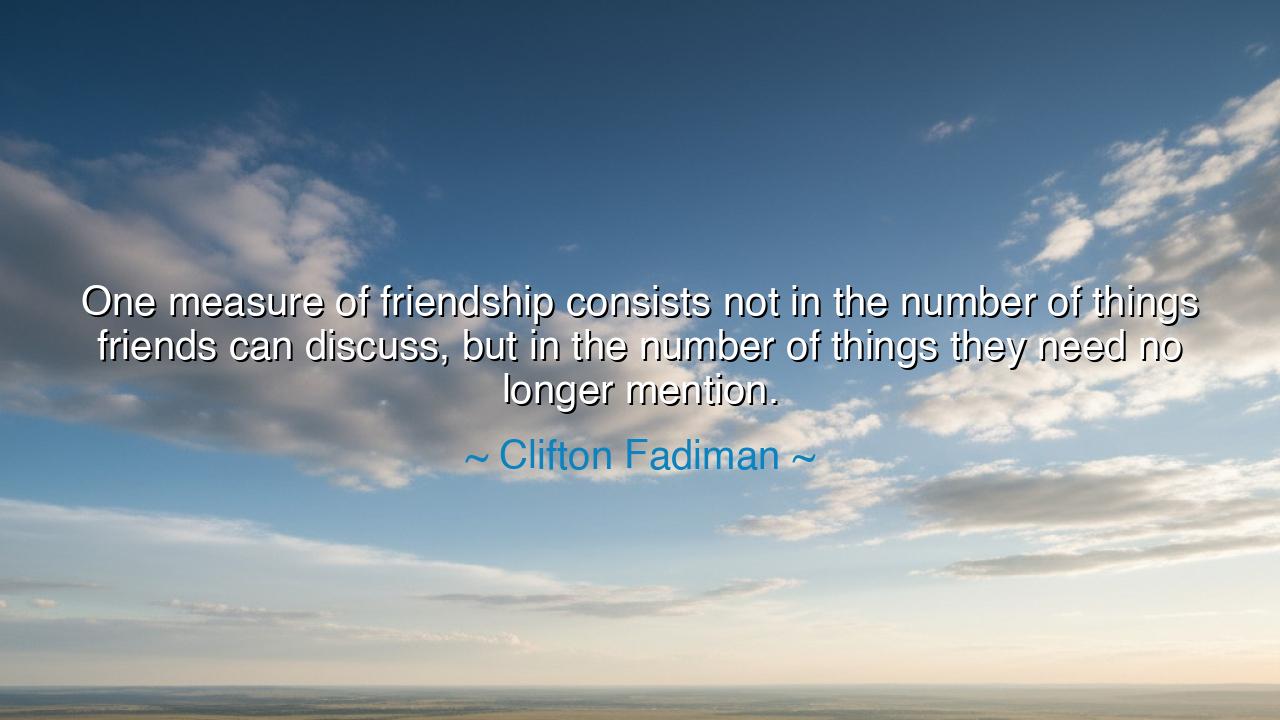
One measure of friendship consists not in the number of things
One measure of friendship consists not in the number of things friends can discuss, but in the number of things they need no longer mention.






“One measure of friendship consists not in the number of things friends can discuss, but in the number of things they need no longer mention.” Thus spoke Clifton Fadiman, a man of letters whose words carry the quiet power of observation and truth. In this reflection, he captures the essence of deep friendship, that sacred bond which transcends speech and finds its dwelling in understanding. For in the beginning of acquaintance, men must speak much to be known; but in the fullness of friendship, silence itself becomes eloquent. The truest friends do not need to explain, to justify, or to repeat. They dwell in a harmony of hearts where thought is shared without utterance, and meaning flows beneath the surface of words.
The origin of this insight lies in Fadiman’s lifelong communion with literature, philosophy, and human nature. As a writer and critic, he understood that words are powerful—but also that they are imperfect vessels. Language builds bridges, yes, but it also has limits. And in friendship, the deepest connections are not built by language, but by trust, by shared history, by the quiet resonance of souls. When Fadiman speaks of “the number of things they need no longer mention,” he is describing that sacred space of mutual understanding where speech is no longer necessary, because the bond itself has become the language.
This idea is not new, but ancient in spirit. The wise of old knew that the highest forms of love—be it friendship, kinship, or divine union—transcend the need for words. Aristotle wrote that in true friendship, “one soul inhabits two bodies.” Such unity cannot be explained; it can only be felt. Between such friends, a glance replaces a sentence, and silence becomes as rich as dialogue. Words are but the first steps toward intimacy; once the heart has reached its destination, it can rest quietly in understanding.
We see this truth reflected in the story of Michelangelo and Sebastiano del Piombo, two artists whose friendship endured the rivalries and jealousies of Renaissance Rome. They shared not only their craft but their unspoken respect and admiration. When Michelangelo sent sketches to Sebastiano, he did not need to instruct him in detail—Sebastiano already knew his intent, could sense his spirit in every line. Their letters, though brief, reveal this mutual comprehension, this serenity of friendship that needs few words. Even in silence, they collaborated; even in absence, they remained united. Their bond was not measured by conversation, but by the understanding that transcended speech.
Fadiman’s wisdom also reminds us that the shallower relationships of the world often depend on chatter, on the constant exchange of noise. Acquaintances must fill the air with explanations, with updates, with assurances. But true friends—those whose roots grow deep—need no such performance. They can sit together in silence and feel the comfort of one another’s presence. They can part for years and resume their bond as though no time has passed. This is the mark of friendship’s maturity: when words are no longer needed to maintain closeness, when the heart itself speaks in the quiet language of remembrance, trust, and affection.
Yet, Fadiman does not dismiss the beauty of conversation. Speech, after all, is the birthplace of all friendship—it is through stories and laughter, shared hopes and confessions, that the bond first takes form. But his insight calls us to recognize that there comes a time when talk gives way to communion, when the friendship becomes so deeply woven into the fabric of being that explanation ceases to matter. In that moment, friends are no longer merely exchanging thoughts—they are sharing existence.
Let this be the lesson: seek not friendships that are built on constant noise, but those that can endure silence. Speak freely, yes, but also learn the language of stillness. When you find a friend with whom you can sit in peace without the need to speak, know that you have found something rare and holy. Cherish such friendship, for it is a reflection of the soul’s deepest harmony.
So remember the wisdom of Clifton Fadiman: friendship is not measured by the words exchanged, but by the understanding that needs no words at all. In a world overflowing with speech, let your truest bonds be those where silence is shared like sacred ground. For where words end, friendship begins—and in that quiet, two hearts beat as one, needing nothing more than the certainty that they are known, and loved, completely.






AAdministratorAdministrator
Welcome, honored guests. Please leave a comment, we will respond soon